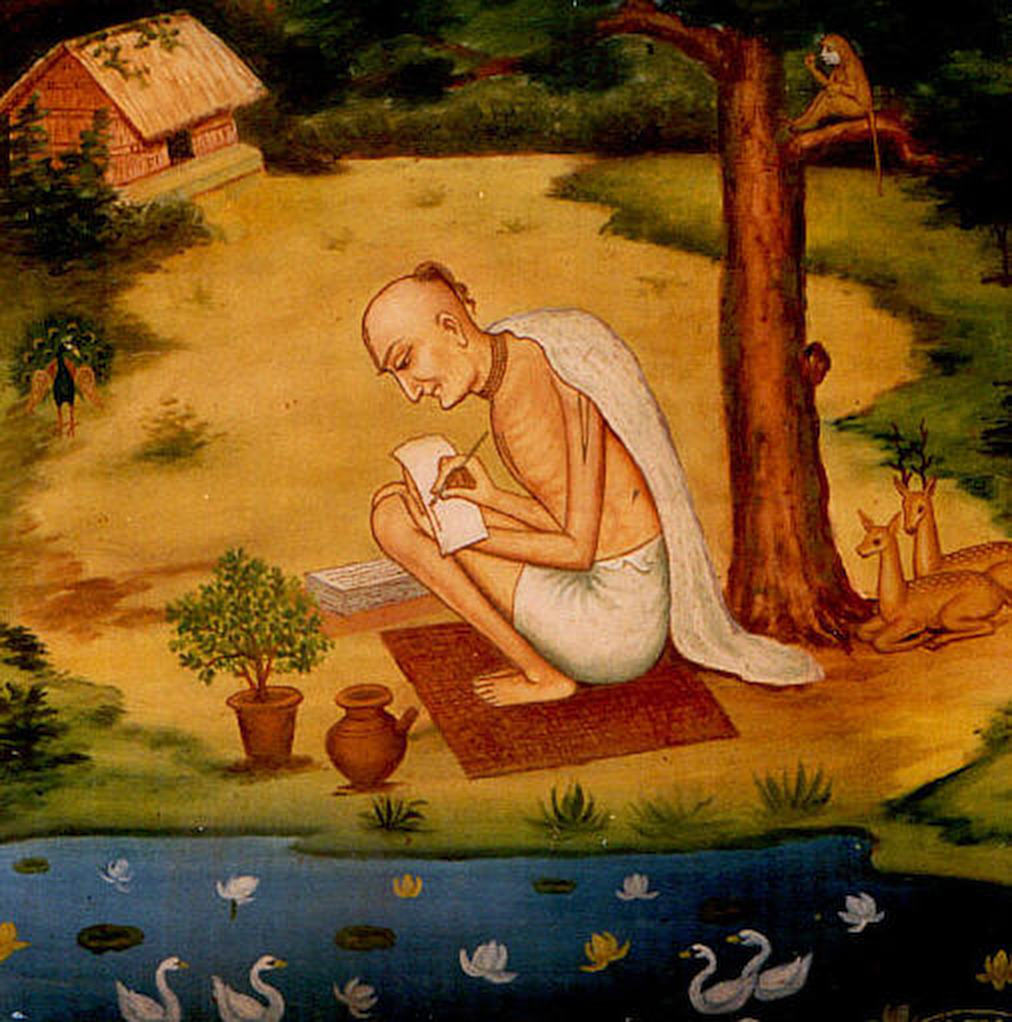Depth from defence
One of the things I most appreciated from the life of Kaviraja Goswami was the strength and vision he received from defending the Lord and His devotees.
Context:
This event takes place with a personality by the name of Sri Minaketana Ramadasa, a servant of Nityananda Prabhu. Minaketana’s personality and activities were wondersome. Upon being invited to the home of Krishnadasa, Minaketana, being in a constant state of devotional trance and chanting the names of Nityananda, would sometimes hit people with his flute and slap them. On occasion, upon receiving obeisances from the Vaisnavas, Minaketana would climb atop their shoulders! Despite these externally puzzling events, when gazed at Minaketana Ramadasa, tears would automatically flow from their own eyes, for a constant shower of tears flowed from the eyes of Minaketana Ramadasa.
On one occasion, a respectable brahmana and pujari by the name of Sri Gunarnava Mishra failed to offer respects to Ramadasa. This was due to Misra’s lack of faith in Nityananda Prabhu. Seeing this, Sri Ramadasa became angry and spoke: “Here I find the second Romaharsana-Suta, who did not stand to show honour when he saw Lord Balarama.”
After saying this, Ramadasa danced and sang to his heart’s content, but the brahmana did not become angry, for he was then serving Lord Krishna. Internally, Gunarnava Mishra was pleased with having been chastised by Ramadasa. At the end of the kirtan festival, when Gunarnava Mishra had left, Krishnadasa’s brother got into an argument with Minaketana Rama about what had happened. Krishnadasa’s brother had firm faith in Caitanya Mahaprabhu but lacked similar faith in Nityananda. Upon hearing this, Minaketana Rama was deeply offended, broke his flute and left in anger. The result of this curse was that Krishnadasa’s brother was doomed to fall away from the platform of devotional service.
On the back of this incident, Krishnadasa heavily rebuked his brother:
“These two brothers [Caitanya and Nityananda] are like one body; they are equal in their spiritual manifestation. If you do not accept the divinity of Lord Nityananda, you will fall down. To have faith in one but to disrespect the other is as logical as accepting half a hen. Better you should be an atheist by denying the divinity of both than a hypocrite who believes in one and not the other.”
CC Adi 5.175-7
As Krishnadasa lay asleep that very night, Nityananda Prabhu, being overwhelmingly pleased with his chastisement of his brother, appeared to him in a dream. Being speechless and completely shocked, Krishnadasa was instructed by Nityananda Prabhu:
“āre āre kṛṣṇadāsa, nā karaha bhaya
CC Adi 5.195
vṛndāvane yāha, — tāṅhā sarva labhya haya
“O my dear Krishnadasa, do not be afraid. Go to Vrindavana, for there you will attain all things.”
The next morning, in great happiness, Krishnadasa left for Vrindavan at once. Had Krishnadasa never stood up for Ramadasa and rebuked his brother for such an offence, we may not know the latter pastimes of Mahaprabhu. This incident paved the way for the perfectly composed, jewel-like literature of the Caitanya Caritamrita to be written.
Application:
1) Duty of a Vaisnava to defend
In the Caitanya Bhagavata, Madhya Khanda Chapter 20, it is written: The Vedas clearly describe that if one hears criticism of a Vaisnava devotee of the Lord, he loses all his accumulated piety and is cast into abominable conditions of life, birth after birth.
I felt this such an applicable lesson for us: regardless of who commits an offence, be it our family, close friends, partner etc., as followers of Kaviraja Goswami we have a responsibility to defend any allegation. In so doing, one progresses spiritually and is able to gain the grace of Nityananda Prabhu.
2) Faith in Gaura isn’t complete without Nitai
Faith in God without Guru is synonymous with a novice practitioner of Bhakti. It’s easy to honour supremacy yet treat friends with jealousy. For one on the path, both God and Guru are essential. In fact, we understand the attraction to one’s spiritual guide will thrust one further forward than an individual who worships God but is apathetic towards His followers. In the 2nd verse of the CC, Kaviraja Goswami explains the concurrent nature of Caitanya and Nitai:
vande śrī-kṛṣṇa-caitanya-nityānandau sahoditau
CC Adi 1.2
gauḍodaye puṣpavantaucitrau śan-dau tamo-nudau
I offer my respectful obeisances unto Śrī Kṛṣṇa Caitanya and Lord Nityānanda, who are like the sun and moon. They have arisen simultaneously on the horizon of Gauḍa to dissipate the darkness of ignorance and thus wonderfully bestow benediction upon all.
3) Offence leads to obscurity
A fascinating aspect of this story is that the name of Krishnadasa’s brother is unknown. Imagine being intimately related to the greatest author in medieval India and being the cause of your brother’s journey to Vrindavan, yet your name doesn’t appear in the written narration. It was only in the mid-1900s when Haridasa Babaji, author of in the Gaudiya Vaishnava Abhidhana, through extensive research published that his brother was in fact named Shyama Das Kaviraja. Offences lead one to wither into obscurity.
